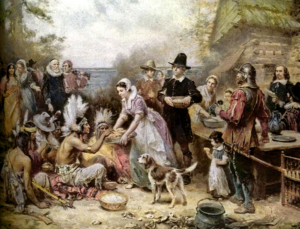Thankful for Thanksgiving
November 24, 2010
Share This Post:
Beginning in 1621 both Pilgrims and Indians began celebrating Thanksgiving together giving thanks to God Almighty for his miraculous provisions.
In 1789, a congressional resolution was delivered to President George Washington, who heartily concurred with the request and issued the first federal Thanksgiving proclamation, declaring in part: Whereas it is the duty of all nations to acknowledge the providence of Almighty God, to
obey His will, to be grateful for His benefits, and humbly to implore His protection and favor. . . .
Now, therefore, I do appoint Thursday, the 26th day of November 1789 . . . that we may all unite to render unto Him our sincere and humble thanks for His kind care and protection.
In 1863 the Thanksgiving proclamation issued by Abraham Lincoln was remarkable not only for its strong religious content but also for its timing, for it was delivered in the midst of the darkest days of the Civil War, with the Union having lost battle after battle throughout the first three years of that conflict.
Yet, despite those dark circumstances, Lincoln nevertheless called Americans to prayer with an air of positive optimism and
genuine thankfulness, noting that: The year that is drawing toward its close has been filled with the blessings of fruitful
fields and healthful skies.
To these bounties, which are so constantly enjoyed that we are prone to forget the Source from which they come, others have been added which are of so extraordinary a nature that they can not fail to penetrate and soften even the heart which is habitually insensible to the ever- watchful providence of Almighty God. . . .
No human counsel hath devised nor hath any mortal hand worked out these great things.
They are the gracious gifts of the Most High God, Who, while dealing with us in anger for our sins, hath nevertheless remembered mercy.
That remarkable Thanksgiving Proclamation came at a pivotal point in Lincoln’s spiritual life. Three months earlier, the Battle of Gettysburg had occurred, resulting in the loss of some 60,000 American lives.
It had been while Lincoln was walking among the thousands of graves there at Gettysburg that he first committed his life to Jesus Christ.
As he later explained to a clergyman: When I left Springfield [Illinois, to assume the Presidency], I asked the people to pray for me. I was not a Christian. When I buried my son, the severest trial of my life, I was not a Christian. But when I went to Gettysburg and saw the graves of thousands of our soldiers,
I then and there consecrated myself to Christ.
As you celebrate Thanksgiving this year, remember to retain the original gratefulness to God that has always been the spirit of this – the oldest of all American holidays.
Let me share with you additional examples of Thanksgiving proclamations penned by various Founding Fathers.)
[Congress] recommended [a day of] . . . thanksgiving and praise [so] that “the good people may express the grateful feelings of their hearts and join . . . their supplication that it may please God, through the merits of Jesus Christ, to forgive [our sins] and . . . to enlarge [His] kingdom which consists in righteousness, peace and joy in the Holy Ghost.”
Continental Congress, 1777 – written by SIGNERS OF THE DECLARATION SAMUEL ADAMS AND RICHARD HENRY LEE
[I] appoint . . . a day of public Thanksgiving to Almighty God . . . to [ask] Him that He would . . . pour out His Holy Spirit on all ministers of the Gospel; that He would . . . spread the light of Christian knowledge through the remote corners of the earth; . . . and that He would establish these United States upon the basis of religion and virtue.
GOVERNOR THOMAS JEFFERSON, 1779
[I] appoint . . . a day of public thanksgiving and praise . . . to render to God the tribute of praise for His unmerited goodness towards us . . . [by giving to] us . . . the Holy Scriptures which are able to enlighten and make us wise to eternal salvation. And [to]present our supplications…that He would forgive our manifold sins and . . . cause the benign religion of our Lord and Savior Jesus Christ to be known, understood, and practiced among all the inhabitants of the earth. GOVERNOR JOHN HANCOCK, 1790


